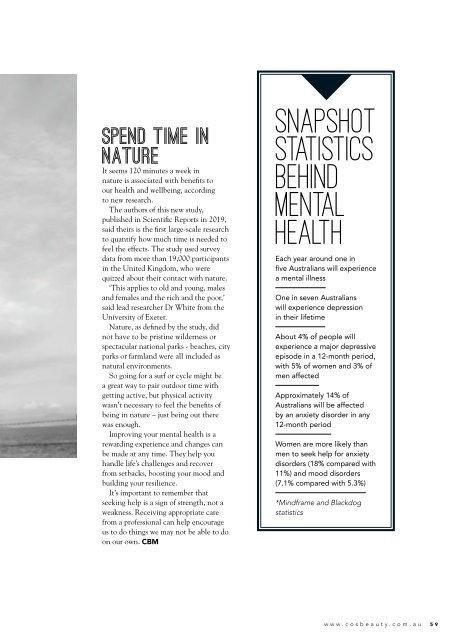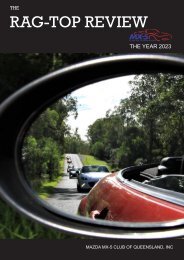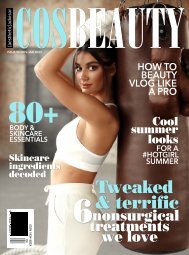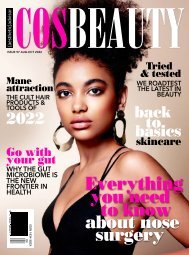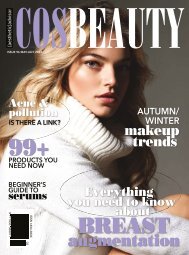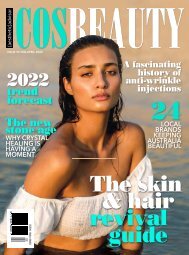CosBeauty Magazine #85
CosBeauty is the #BeautyAddict's guide to lifestyle, health and beauty in Australia. In this issue: - The Breast Report - your guide to augmentation - Put an end to bad hair days - 24 hour makeup, products that last - Sex appeal - do you have it?
CosBeauty is the #BeautyAddict's guide to lifestyle, health and beauty in Australia.
In this issue:
- The Breast Report - your guide to augmentation
- Put an end to bad hair days
- 24 hour makeup, products that last
- Sex appeal - do you have it?
Create successful ePaper yourself
Turn your PDF publications into a flip-book with our unique Google optimized e-Paper software.
spend time in<br />
nature<br />
It seems 120 minutes a week in<br />
nature is associated with benefits to<br />
our health and wellbeing, according<br />
to new research.<br />
The authors of this new study,<br />
published in Scientific Reports in 2019,<br />
said theirs is the first large-scale research<br />
to quantify how much time is needed to<br />
feel the effects. The study used survey<br />
data from more than 19,000 participants<br />
in the United Kingdom, who were<br />
quizzed about their contact with nature.<br />
‘This applies to old and young, males<br />
and females and the rich and the poor,’<br />
said lead researcher Dr White from the<br />
University of Exeter.<br />
Nature, as defined by the study, did<br />
not have to be pristine wilderness or<br />
spectacular national parks - beaches, city<br />
parks or farmland were all included as<br />
natural environments.<br />
So going for a surf or cycle might be<br />
a great way to pair outdoor time with<br />
getting active, but physical activity<br />
wasn’t necessary to feel the benefits of<br />
being in nature – just being out there<br />
was enough.<br />
Improving your mental health is a<br />
rewarding experience and changes can<br />
be made at any time. They help you<br />
handle life’s challenges and recover<br />
from setbacks, boosting your mood and<br />
building your resilience.<br />
It’s important to remember that<br />
seeking help is a sign of strength, not a<br />
weakness. Receiving appropriate care<br />
from a professional can help encourage<br />
us to do things we may not be able to do<br />
on our own. cbm<br />
Snapshot<br />
statistics<br />
behind<br />
mental<br />
health<br />
Each year around one in<br />
five Australians will experience<br />
a mental illness<br />
One in seven Australians<br />
will experience depression<br />
in their lifetime<br />
About 4% of people will<br />
experience a major depressive<br />
episode in a 12-month period,<br />
with 5% of women and 3% of<br />
men affected<br />
Approximately 14% of<br />
Australians will be affected<br />
by an anxiety disorder in any<br />
12-month period<br />
Women are more likely than<br />
men to seek help for anxiety<br />
disorders (18% compared with<br />
11%) and mood disorders<br />
(7.1% compared with 5.3%)<br />
*Mindframe and Blackdog<br />
statistics<br />
www.cosbeauty.com.au 59


